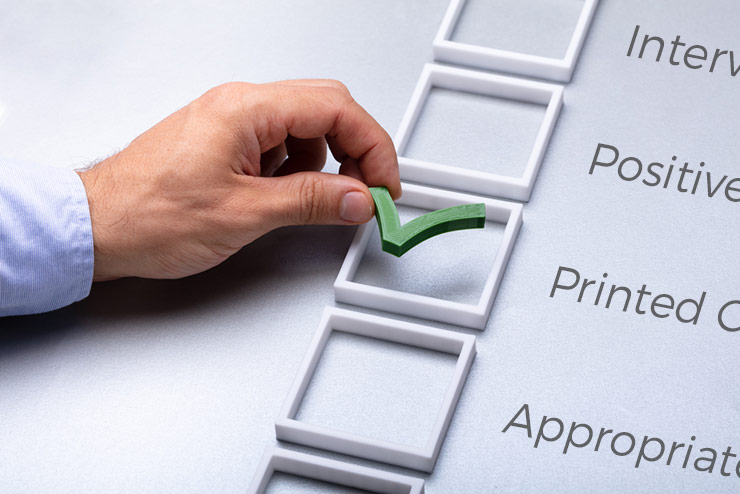The day has come — you’ve received your big interview callback! The date is set and you are frantically searching for all the advice you can get. At some point your research gets stalled by this seemingly simple question — what should I bring to an interview? Well, we’ve got you covered!
What to Bring to an Interview: Quick Checklist
Let’s start with the basics. You are about to leave the house and head to that in-person interview. Whether it is your first interview or tenth, be sure to always bring the following items with you.
1. Interview Address, Time and HR’s Contact Details + Your ID
The last thing you’ll want is to go into panic mode when you arrive on-site and realize you have no idea where to go or how to contact your interviewer. So be sure to:
- Pin the interview address in Google/Apple Maps
- Copy any additional instructions to a note app
- Save the HR’s contact number to you Contacts list
- Grab an official ID
Most workplaces will require you to get a visitor’s badge from the building security. Imagine how awkward things can get if you forget a document, verifying your ID. Ouch, that’s really the worst way to sabotage an interview.
2. Positive Attitude
Yes, job interviews are stressful. You may be tired, burned out, or frustrated by the fact that you have to slip to the interview during your lunch break. But don’t let these emotions show during an interview.
Before you enter the building, take a good gulp of water, a deep breath, and tell yourself that you’ve got this! The ‘self-talk’ part is particularly important. Multiple studies proved that we can majorly increase our confidence and effectiveness by merely talking to ourselves. In fact, the best gymnasts who made it to the Olympic team regularly practiced self-talk (unlike those who didn’t).
3. Printed Copy of Your Resume (and Other Application Materials)
Yes, most job applications these days happen digitally. Still, it’s a good gesture to bring a printed copy of your professional-looking resume. Why?
Well, first of all, recruiters are busy folks. So sometimes they may forget to bring their copy of your resume, or worse — print out another applicant’s resume. This mishap can easily derail the interview and undermine your confidence. So yeah, it’s best to have a back-up copy ready.
Secondly, by having your resume laid in front of you, you can always have a quick peek into the formulations and data you’ve used in it and weave these into your interview answers. Think of a printed resume copy as your cheat sheet.
Depending on your career niche and job requirements, you may also need to bring additional job application documents such as:
- Work samples
- Reference letters
- Licenses/certifications copies
- Your portfolio item(s)
- Anything else that was explicitly requested in the job ad.
Having a nicely organized stoss of documents shows the HR that you did your prep work and can follow directions.
4. Appropriate Attire
You’ve gotta come dressed for your part. By that we mean wearing something presentable and suitable for the occasion. Even if you are applying to a relaxed “startup-style” company, it’s still best to get dressed up for the job interview.
Business casual attire is the safest way to go unless you are applying for a more traditional ‘white-collar’ job that assumes daily wear of suits and ties.
If you are wearing a uniform at work, you may want to grab a set of change clothes to wear specifically for the interview, or just some “smarter” items like a good jacket or a tie.
5. An Assortment of “Emergency Items”
If you’ve been reading our ongoing Career (Con)Quest comics series (which you totally should!), you know that a lot of things can go wrong during a job interview. The last thing you want is to sweat over some minor (but annoying!) issue like a stuffed nose as you are about to walk into the room.
That’s why it’s always worth keeping the following items in your ‘interview’ bag:
- Water
- Tissues
- Any special medicine that you may need
- Pens
- Notebook
- Phone charger/portable battery
- Compact mirror
- Band-aids
- Breath mints or mouthwash
- A small non-sticky snack
- A change pair of tights
- Makeup (if you wear any) and makeup tissues
6. Practiced Interview Answers
You should roll into the interview with your act ready. That means being fully prepared to answer the most common interview questions. But remember: practiced ≠ rehearsed. You should have a good sense of what to say and which career examples to bring up on different occasions, rather than fire out a monotone answer that you’ve carved into your memory the night before.
Like any other type of conversation, job interviews should have a natural flow. The other party should feel that you are confident in your answers, but, at the same time, can easily talk on other subjects job-related or not.
7 Things You Should Never Bring To the Job Interview
Here’s a quick tip explaining how to ace an interview — never-ever attempt to bring the following items into the room:
- Your Mom or another “Support Party”. Even if you are a high school student, this is still inappropriate.
- Your pet. A dog-friendly office does not mean that you should drag Fido to the interview, too.
- A mobile phone that keeps buzzing. Put your gadget in silent mode or turn it off entirely.
- A waft of heavy perfume that will make the interviewer’s eyes water.
- Any type of food with a smell — that fish sandwich gotta stay home!
- Salary demands set in stone. You can keep a range in mind, but don’t make any concrete demands during the first job interview!
- Chewing gum. You’ll have a hard time figuring out where to spit it or worse — choke on it as you speak.
Also, consider leaving any other bulky items like a tote with groceries, a suitcase, or another random item in your car or somewhere else.






